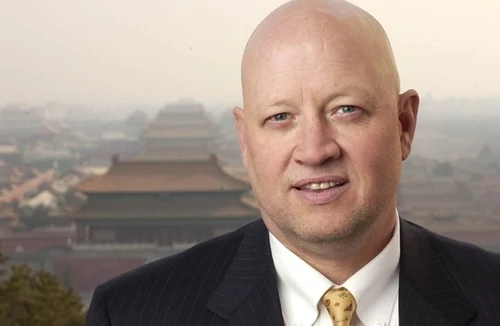Whether Donald Trump is re-elected, or Joe Biden becomes the next president, there is little doubt that the United States will continue to pursue hardline policies with China, writes James McGregor, Greater China Chairman at APCO Worldwide
The belief that China is an untrustworthy bad actor at home and abroad is the one bipartisan issue in today’s deeply divided Washington. The consensus that China was on a path to become a “responsible stakeholder” in the existing international system has also been shattered.
Instead, politicians and policy makers of both parties feel betrayed and somewhat bamboozled by China’s failure to reciprocate on the goodwill America invested by opening its markets and universities, helping China to build its legal system, refurbish its scientific and technological organisations and join international bodies such as the World Trade Organisation.
Whoever sits in the White House will also deal with the 117th Congress, which will inherit a long policy agenda on China. In the 116th Congress, Democrats and Republicans introduced some 400 bills and resolutions aimed at China for transgressions ranging from technology theft to human rights violations to failing to contain the COVID-19 pandemic. The mood of Congress can be summed up in this statement from a recent editorial by Senate Foreign Relations Chairman James Risch: “China is the single most significant threat facing the United States, and we must act swiftly to protect our sovereignty and push back against China’s increasingly dangerous conduct.”
Nonetheless, Trump and Biden will likely emphasise different issues and certainly present different styles of dealing with China.
A Trump Second Term: More of the Same?
Trump is not much interested in human rights and has been almost silent on Xinjiang and Hong Kong. But he is keenly interested in the stock market and the US economy. In a second term, no longer needing to bash China on trade for his electoral prospects, Trump may well reverse course to make sure American companies can remain globally competitive through a strong presence in the growing China market instead of pushing for them to get out of China and come home. Trump is transactional, not ideological, so this would not be a shocking turnabout.
It would not be surprising to see Trump employing the prospect of getting Secretary of State Mike Pompeo and other administration hardliners to moderate their aggressive anti-China global campaign and sanctions in return for a Phase Two trade agreement. Trump is a numbers guy, and he knows that if America’s leading companies are not prominent in the enormous China market, they will lose out globally.
Trump may well reverse course to make sure American companies can remain globally competitive through a strong presence in the growing China market instead of pushing for them to get out of China and come home.
China Policy Under a Biden Presidency
If Biden is elected, we will see a return to traditional American foreign policy norms: emphasising human rights, working with partners and allies, recommitting to world institutions and rejoining the Iran nuclear deal, the Paris climate accord and perhaps even the Trans Pacific Partnership. His 36 years in the US Senate and 8 years as vice-president will likely make him more prone to work with Congress on China legislation. There are a number of extensive and serious bills in Congress put forth by Republicans and Democrats that are similar to Biden campaign proposals to invest in American innovation, federal R&D, science and technology education, and advanced industrial infrastructure.
While Trump has mostly been focused on trying to contain China, Congressional stakeholders and Biden’s team are advocating policies to compete with China and create jobs in advanced materials, biotechnology, AI, aerospace, clean energy and most of the other technologies and industries that China is pursuing through its Made in China 2025 and other state-supported technology policies.
Advice for UK Companies in China
No matter who sits in the White House after this election, China will remain the central focus of American economic and foreign policy. Whether through Trump’s strategy of containment or Biden’s pursuit of competition, the nature of commercial relations between the two countries will be constantly under review, especially in high-end technologies. This is an opportunity for UK companies.
Politically, the UK has sat between a rock and a hard place since Trump started his tariff war in 2018, and has become increasingly wary of compromising a post-Brexit trade deal with its ally across the pond. This has driven support for the US positions on trade, technology decoupling (shown through the decision to remove Huawei from the UK’s 5G networks) as well as sovereignty issues in Hong Kong, Xinjiang and the South China Sea. However, commercially, the difference is that the UK is not engaged in a tech war with China.
With the US looking inward to compete with China in frontier technologies, UK companies should assess how they can fill the void in the supply chains of strategic industries such as advanced manufacturing and green technology.
UK companies looking to expand in China should pay close attention to the upcoming release of the 14th Five-Year Plan, which will serve as a blueprint for China’s post-Covid-19 development and the industries which will drive it. In particular, we can expect to hear details about “dual circulation”, China’s post-COVID strategy which prioritises domestic development (internal circulation) but with the support of foreign trade and investment (outer circulation).
With the US looking inward to compete with China in frontier technologies, UK companies should assess how they can fill the void in the supply chains of strategic industries such as advanced manufacturing and green technology. These emerging opportunities exist alongside traditional UK competitive advantages such as finance, professional services and education, all of which are likely to increase under the continued tensions in US-China relations.
Jim McGregor will be giving a briefing to CBBC’s Premium members on the 29th of October, details of which can be found here.


